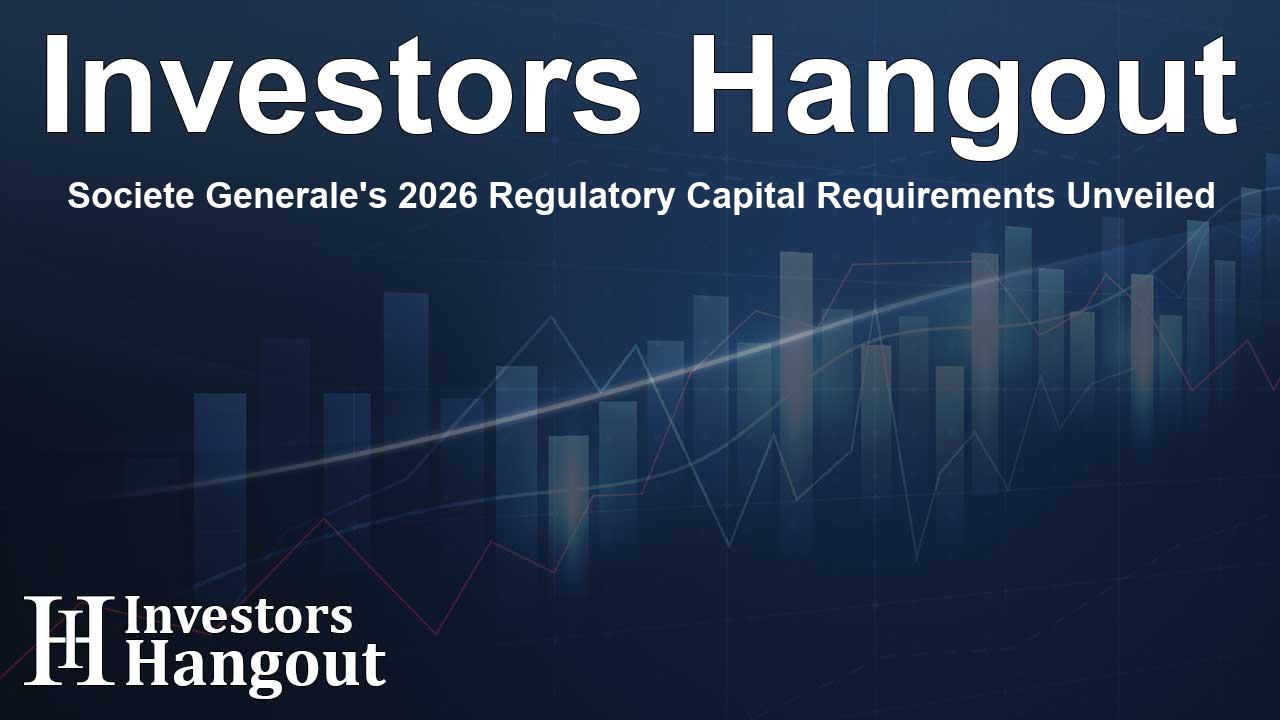Societe Generale's 2026 Regulatory Capital Requirements Unveiled

Understanding Societe Generale's Updated Regulatory Requirements
In a significant communication from the European Central Bank, Societe Generale Group has been informed about the forthcoming Pillar 2 Requirement (P2R) that will take effect in January 2026. This update is crucial not just for the bank but also for investors and stakeholders who have a keen interest in the financial industry.
The Pillar 2 Requirement Explained
The new P2R for Societe Generale has been set at 2.36%. This requirement mandates that at least 1.38% of this ratio be composed of Common Equity Tier 1 (CET1), incorporating a specific 0.11% related to Pillar 2 prudential expectations on calendar provisioning for non-performing loans that were granted before a defined date.
Mandatory Capital and Leverage Ratios
From January 1, 2026, Societe Generale will adhere to stringent capital requirements. These encompass a consolidated CET1 minimum requirement of 10.26%, which includes a countercyclical buffer of 0.85%. Additionally, the Tier 1 ratio is set at 12.19% and the Total Capital ratio stands at 14.74%. Understanding these metrics is essential for assessing the bank’s stability and capital strength.
Leverage Ratio Requirements
The European Central Bank has also established a Leverage Ratio P2R for the Group, which is currently set at 0.1%. Hence, the overall minimum leverage ratio requirement that the Group must uphold is 3.6%. These ratios reflect the bank's robust approach to maintaining fiscal health amid evolving market conditions.
Current Financial Standing
As of the end of September 2025, the CET1 ratio for Societe Generale stands comfortably at 13.7%, indicating a pro forma buffer of approximately 340 basis points above the required standards. In terms of leverage, the ratio sits at 4.35%, significantly exceeding the mandatory 3.6% requirement. Such figures demonstrate the bank's fiscal resilience and its capacity to meet regulatory expectations.
Societe Generale's Vision and Core Values
Societe Generale is recognized as a leading European bank, boasting a workforce of around 119,000 employees and catering to over 26 million clients across 62 countries. The institution has cemented its presence over 160 years by delivering a wide variety of advisory and financial solutions to corporate, institutional, and individual clients alike. Their comprehensive suite of operations is centered around creating sustainable value for all stakeholders.
A Broad Spectrum of Services
Committed to future sustainability, Societe Generale operates through three core business divisions that integrate environmental, social, and governance (ESG) factors into their offerings. These divisions include:
French Retail, Private Banking, and Insurance
This segment covers a prominent retail bank, a leading insurance franchise, and premium private banking options, all enhanced by the dynamic digital bank, BoursoBank. These services illustrate the bank’s commitment to providing tailored offerings that meet diverse client needs.
Global Banking and Investor Solutions
Positioned as a key player in the wholesale banking sector, this area specializes in creating bespoke solutions, especially excelling in equity derivatives and structured finance. Their strong focus on ESG principles positions them favorably in today's market.
International Retail Banking and Financial Services
This division encompasses established banks in various regions including the Czech Republic, Romania, and parts of Africa. With entities like Ayvens, associated with sustainable mobility finance, Societe Generale is making its mark on innovative banking and sustainable solutions.
Commitment to Sustainability
Societe Generale is dedicated to partnering with its clients for a sustainable future. This commitment is recognized globally, as the bank is listed in major socially responsible investment indices such as DJSI and FTSE4Good, among others. Such accolades highlight their leading role in promoting sustainability within the financial landscape.
Frequently Asked Questions
What are the new capital requirements for Societe Generale?
The new capital requirements set a CET1 minimum of 10.26%, a Tier 1 ratio of 12.19%, and a Total Capital ratio of 14.74% starting in January 2026.
How does the leverage ratio requirement impact the bank?
The leverage ratio requirement, set at a minimum of 3.6%, ensures that Societe Generale maintains robust capital stability across its operations.
What is Societe Generale's stance on sustainability?
Societe Generale emphasizes sustainability by integrating ESG principles into all its services and aims to be a leader in environmental transition.
How many employees does Societe Generale have?
Societe Generale employs approximately 119,000 people worldwide, serving over 26 million clients.
Where can I find out more about Societe Generale?
More information about Societe Generale and its services can be found on their official website and social media platforms.
About The Author
Contact Henry Turner privately here. Or send an email with ATTN: Henry Turner as the subject to contact@investorshangout.com.
About Investors Hangout
Investors Hangout is a leading online stock forum for financial discussion and learning, offering a wide range of free tools and resources. It draws in traders of all levels, who exchange market knowledge, investigate trading tactics, and keep an eye on industry developments in real time. Featuring financial articles, stock message boards, quotes, charts, company profiles, and live news updates. Through cooperative learning and a wealth of informational resources, it helps users from novices creating their first portfolios to experts honing their techniques. Join Investors Hangout today: https://investorshangout.com/
The content of this article is based on factual, publicly available information and does not represent legal, financial, or investment advice. Investors Hangout does not offer financial advice, and the author is not a licensed financial advisor. Consult a qualified advisor before making any financial or investment decisions based on this article. This article should not be considered advice to purchase, sell, or hold any securities or other investments. If any of the material provided here is inaccurate, please contact us for corrections.
